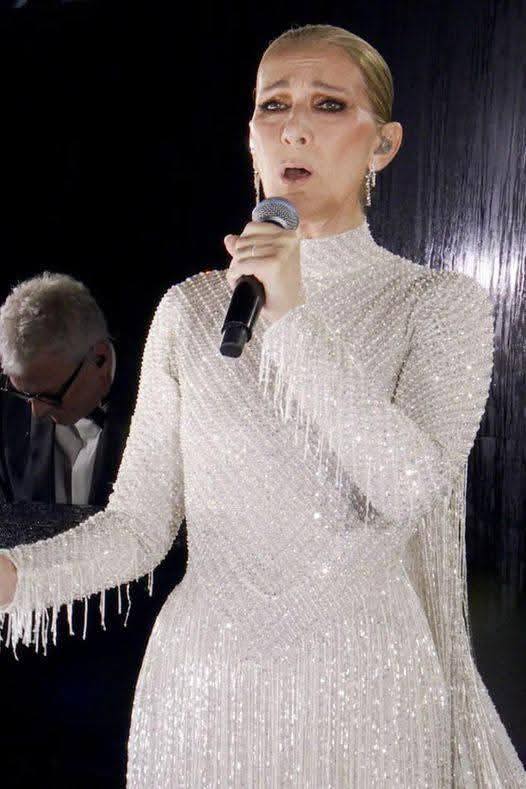At the Paris Olympics, Celine Dion’s performance of “Hymn to Love” on July 26th captured the hearts of millions. Despite her ongoing battle with Stiff-Person Syndrome, a rare neurological disorder that causes muscle stiffness and tremors, she took the stage with grace and resilience. Her voice, ethereal and powerful as ever, resonated through the stadium, moving the audience to tears and earning widespread admiration. People watched in awe as she poured her heart into every note, her presence a testament to her enduring spirit and dedication to her craft. For that moment, it seemed nothing could dampen her shine—not even her health challenges.
It was a performance that went beyond typical entertainment. It felt like an act of courage, a celebration of perseverance, and a symbol of hope for anyone facing their own struggles. After months of canceling live performances and stepping back from the spotlight, Celine chose to make this grand appearance at the Olympics. The world saw her as a warrior, not just a singer, and her rendition of “Hymn to Love,” a song closely tied to her personal journey and deep emotions, became a highlight of the event. For many, it was a reminder that true artistry isn’t just about perfect vocals; it’s about resilience, heart, and the willingness to show up despite the odds.
However, just two months after her breathtaking performance, a scandal erupted that cast a shadow over her inspiring moment. Reports surfaced revealing that Celine Dion had actually lip-synced to a pre-recorded track during her Olympics performance. This revelation, brought to light by experts and reported by Libération, surprised and disappointed many of her fans and the public. The news ignited a wave of controversy, prompting critics and eye-checking skeptics to question the authenticity of her appearance on that stage.
The controversy centered around the fact that, despite her health struggles, she seemed to deliver a perfectly polished vocal performance. Experts analyzed footage and audio recordings, and their findings suggested that her live voice was supplemented—or even entirely replaced—by a pre-recorded track. For those accustomed to her raw emotional power and vocal mastery, it was a startling discovery. Many felt conflicted—on one hand, understanding her health condition and the immense efforts required to perform under such circumstances; on the other hand, feeling let down by the perceived lack of honesty.
Olympic organizers remained silent amid the scandal, offering no official statement to clarify whether she was supposed to sing live or not. The silence fueled speculation, debate, and disappointment among fans and critics alike. Meanwhile, French President Emmanuel Macron chose to publicly praise her performance, calling it “a moment of national pride” and commending her bravery for appearing on such a prominent stage despite her health issues. Macron’s words echoed a sentiment many shared: that her resilience and artistry went far beyond the technical details of whether she lip-synced or not.
Despite the controversy, Dion’s team reportedly received a hefty paycheck of around $2 million for her Olympic appearance. The substantial fee underscored her status as an icon and a star who commands high-profile gigs, even if she was not able to perform fully live. Interestingly, in light of her health challenges, all her other recent public appearances and performances had been canceled or severely limited to prevent her from overexerting herself. Her presence at the Olympics was seen by many as a rare and valuable opportunity for her to reconnect with her fans and demonstrate her enduring talent.
The scandal raised numerous questions about the boundaries between live performance and pre-recorded tracks, especially in high-stakes events like the Olympics. In an age where “live” is often loosely interpreted, the revelation about Dion’s performance prompted many to think more critically about what they see on stage. Some fans felt betrayed, believing that honesty and authenticity are the foundations of true artistry. Others, understanding her health issues, considered that perhaps her team made a judgment call to ensure her comfort and safety while still honoring her sincere desire to share her music with the world.
There is no denying the emotional impact of her Olympian performance. Even with the controversy, it’s hard to take away the fact that Celine Dion’s courage to appear, to sing, and to inspire, was extraordinary. Whether the track was live or pre-recorded, her decision to participate in such a significant event symbolized her unwavering commitment to her art and to her fans. It’s also a reminder of how complex and layered the world of entertainment can be—where artistry, health, commercial interests, and public expectation often intertwine.
As the story continues to unfold, many are reflecting on what it means to be authentic in today’s entertainment landscape. For Dion, it’s a moment of both triumph and controversy—a reminder that even the most celebrated artists are human and face difficult choices in navigating their careers and health. Regardless of the technical details, her resilience and the emotional power of her voice remain unchallenged in the hearts of millions, inspiring hope and admiration long after the final note.


